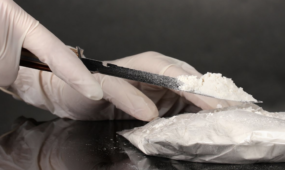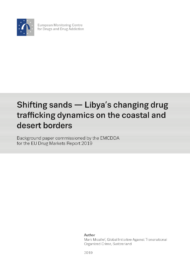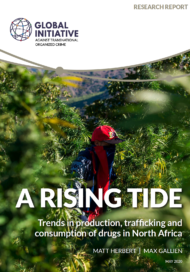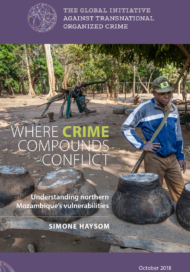For the connection between illicit drug trafficking and Niger, look no further than the state.
Flows of cocaine and cannabis resin in the Sahel and Sahara have attracted much international attention in recent years overconcerns of a possible narco-jihadist nexus and collaboration between drug cartels in South America and jihadist groups in Africa. Recent fieldwork carried out by the Global Initiative in Niger, however, suggests that these flows are actually controlled by a very closed network of actors, and claims of a narco-jihadist connection are still widely exaggerated.
Moving large amounts of high-value drugs through territory rife with banditry, and where a host of armed groups control the networks and territory, requires high-level connections across several governments and non-state actors, considerable financing, logistical expertise and the ability to use force against potential rivals. These networks may operate in similar spaces to jihadist groups, but this proximity cannot credibly be interpreted as an alliance.
Despite the lack of evidence, claims of a narco-jihadist connection persist, and with certain policymakers in Europe eager to add migrant smuggling and human trafficking as a third node in this alleged nexus, delineating the separate phenomena of violent extremism, drug trafficking, and migrant smuggling is as important as ever from both an analytical and a policy perspective.
A more important link, and one that constantly undermines both the credibility of the Nigerien government in the eyes of its citizens and, by extension, the credibility of European governments so eager to funnel resources to it, is the one that exists between narco-traffickers and the Nigerien state. Perhaps the most instructive case in this regard is that of deceasedNigerien businessman cum political operative Cherif Ould Abidine, known locally in Agadez as ‘Cherif Cocaine’.
For years, it was an open secret that Abidine, who owns major transport companies, was ‘protected’ by Nigerien government officials at the highest levels. Since Abidine’s death in 2016, local and international media have been strident about hisalleged drug trafficking and his ties to the ruling party. It has been said for quite some time that Abidine has poured money into financing political campaigns, most notably of the ruling PNDS party. Among activists and dissidents, the prevailing narrative is that Niger’s president, Mahamadou Issoufou, is propped up and supported by such ‘Arab’ money. The outsize role of illicit cash within Nigerien electoral politics is almost certainly true – although there is little in the way of concrete evidence – but, more importantly, it is accepted as fact locally (as well is in Western intelligence circles), which has implications regarding people’s faith in the credibility of Niger’sinstitutions and Issoufou’s legitimacy.
Besides Abidine’s complicity with the government, activists in Niger are also quick to point out that he was reportedly awarded the contract by the French government to transport military materiel to Madama, a French military base near the Libyan border, which raises the question of how far the French government is willing to turn a blind eye to criminal activity in pursuit of its own security objectives.
Meanwhile, other prominent businessmen, such as Mohamed Rhissa Ali, who is also involved in the transport business and enjoys close ties to ruling elites, is also widely considered to be involved in illicit activities. Rhissa Ali, also known as ‘Rimbo’,is a major donor and funder of PNDS, and was implicated in the Mossack Fonseca Panama Papers leak, which suggests – though does not necessarily prove – that he used offshore accounts to launder money.
Other individuals widely believed to be directly involved in drug trafficking as well as arms trafficking, including former rebels who never signed peace agreements, have managed to more recently parlay their nuisance power along certain trafficking routes into economic and political clout in ways that are unprecedented. These particular actors are blatantly involved in trafficking of a range of illicit goods, have invested heavily in the burgeoning gold-mining economy, and some have reportedly been involved in recent incidents of intercommunal score-settling as various actors vie for control of certain transport routes.
The ascendency of these actors within formal and informal political and security structures, despite the fact that they remain outside of electoral politics, has been widely cited as an example of how informal governance structures are increasingly taking on a criminal nature, undermining traditional balances of power and further eroding confidence in the Nigerien state.
Furthermore, as Europe firms up its partnerships with the Nigerien government – and European policymakers are either unaware of, or willing to tolerate, criminal activity among Nigerien elites – it is hard for Nigerien citizens to take seriously Europe’s claims that it cares about good governance and accountability in Niger.
As one civil–society activist in Agadez told me during a recent trip to northern Niger, it is not just the Nigerien government that tolerates crime and trafficking: ‘Some of these guys have increased their power in ways that aren’t correct. The Nigerien government works with bandits and criminals – but so does Europe,’ he said, in reference to attempts by the Italian government to work with Toubou and Tuareg tribes in southern Libya to curb migrant smuggling. ‘They both use these types of actors to do dirty work.’
* This blog draws on interviews conducted by the author in Agadez and Niamey in December 2017.
Las redes narcotraficantes de Níger
Para conocer la relación entre el tráfico ilícito de drogas y Níger, basta con mirar al Estado.
En los últimos años, los flujos de cocaína y resina de cannabis en el Sahel y el Sahara han atraído mucha atención internacional debido a la preocupación por la existencia de un posible nexo y colaboración entre cárteles narcotraficantes en Sudamérica y grupos yihadistas en Africa. El trabajo de campo realizado recientemente por la Iniciativa Global en Níger sugiere, no obstante, que estos flujos están en realidad controlados por una red muy cerrada de actores, y que las afirmaciones de una relación narco-yihadista siguen siendo exageradas.
Movilizar grandes cantidades de drogas de alto valor en territorios colmados de bandolerismo, y en donde una multitud de grupos armados controlan las redes y el territorio, exige tener conexiones de alto nivel con varios gobiernos y actores no estatales, un financiamiento considerable, experiencia logística, y la habilidad de usar la fuerza contra los rivales que se presenten. Puede que estas redes operen en espacios similares a los grupos yihadistas, pero se trata de una proximidad que no puede interpretarse verazmente como una alianza.
A pesar de la falta de pruebas, persisten las afirmaciones de que existe una conexión entre el narcotráfico y el yihadismo, y ciertos formuladores de políticas europeos parecen deseosos de agregar el tráfico ilícito de migrantes y la trata de personas como un tercer nodo en este supuesto nexo. Desde una perspectiva tanto analítica como política, es más importante que nunca delinear los distintos fenómenos que representan el extremismo violento, el narcotráfico, y el tráfico ilícito de migrantes.
Un vínculo más importante y que socava constantemente la credibilidad del gobierno nigerino a los ojos de sus ciudadanos – y, por extensión, la credibilidad de los gobiernos europeos que tantas ganas tienen de destinar recursos en esto – , es el que existe entre narcotraficantes y el gobierno de Níger. Quizás el ejemplo que mejor demuestra esta situación es el del difunto empresario nigerino y operador político Cherif Ould Abidine, conocido localmente en Agadez como “Cherif Cocaína”.
Durante años, fue un secreto a voces que Abidine, dueño de las principales empresas de transporte, recibía “protección” por parte de funcionarios en el más alto nivel del gobierno nigerino. Desde la muerte de Abidine en 2016, los medios locales e internacionales han sido estridentes sobre su supuesta actividad en el narcotráfico y sus lazos con el partido gobernante. Desde hace un tiempo se dice que Abidine había financiado campañas políticas, principalmente las del partido en funciones, el PNDS. Entre activistas y disidentes, la narrativa que prevalece es que el presidente de Níger, Mahamadou Issoufou, es apoyado y apuntalado por este dinero “árabe”. A pesar de existir escasa evidencia concreta, el enorme papel que cumple el dinero sucio dentro de la política electoral nigerina es muy probablemente cierto, pero más importante aun, es que se trata de una realidad local aceptada que impacta directamente en la confianza del pueblo hacia las instituciones nigerinas y la legitimidad de Issoufou.
Además de la complicidad de Abidine con el gobierno, activistas en Níger señalan rápidamente que, según constan en algunos informes, el gobierno francés le adjudicó el contrato para transportar material militar a Madama, una base militar francesa próxima a la frontera con Libia. Esto nos hace preguntar hasta qué punto el gobierno francés está dispuesto a mirar para otro lado e ignorar la actividad delictiva en busca de sus propios objetivos de seguridad.
Mientras tanto, hay otros empresarios destacados señalados de estar involucrados en actividades ilícitas, como Mohamed Rhissa Ali, quien también opera en el sector del transporte y tiene lazos cercanos con las elites gobernantes. Rhissa Ali, también conocido como “Rimbo”, ha sido uno de los principales donadores para el PNDS, y su nombre aparece en los Panama Papers, lo que sugiere – aunque no necesariamente prueba – que utilizaba cuentas en el exterior para lavar dinero.
Otros individuos que parecen estar implicados directamente en el tráfico ilícito de drogas y armas, entre los que se incluye a ex rebeldes que nunca firmaron los acuerdos de paz, han logrado traducir su poder sobre ciertas rutas de tráfico ilícito en influencia económica y política de una manera sin precedentes. Estos actores participan descaradamente en el contrabando de una serie de bienes, han invertido fortunas en el pujante sector del oro, y se cree que algunos han estado involucrados en incidentes recientes relacionados con ajustes de cuentas, puesto que varios se están disputando el control de ciertas rutas.
El dominio del que gozan estos actores dentro de las estructuras políticas y de seguridad formales e informales, a pesar de estar fuera de las políticas electorales, ha sido ampliamente citado como ejemplo de cómo las estructuras informales de gobernanza están tomando características criminales, socavando el equilibrio tradicional de poder y erosionado aun más la confianza en el Estado nigerino.
Además, conforme Europa consolida su alianza con el gobierno de Níger – y los formuladores de políticas europeos no toman conciencia de la actividad criminal existente entre las elites nigerinas, o están dispuestos a tolerarla – es difícil que los ciudadanos nigerinos crean seriamente que a Europa le importa la buena gobernanza y la rendición de cuentas en Níger, como así lo afirma.
Como me dijo un activista de la sociedad civil en Agadez durante un viaje que realicé hace poco al norte de Níger, no es sólo el gobierno de Níger que tolera la delincuencia y el tráfico: “Algunas de estas personas han aumentado su poder de formas que no son correctas. El gobierno nigerino trabaja con bandidos y delincuentes – pero también lo hace Europa”, sostuvo, en referencia a los intentos del gobierno italiano de trabajar con los Tubu y los Tuareg en el sur de Libia en un intento de contener el tráfico ilícito de migrantes. “Ambos utilizan este tipo de actores para hacer el trabajo sucio.”
* Este articulo se vale de entrevistas realizadas por el autor en Agadez y Niamey en diciembre de 2017.



